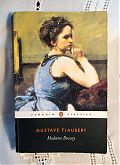
Gustave Flaubert
Madame Bovary x 2
Two years ago I first read Madame Bovary. Many of the thoughts that then I wrote, were about Emma Bovary’s tragic idealism and how that idealism destroyed her. She was unwilling or she simply couldn’t, accept or match herself to the life she had been given. I thought of Emma Bovary as a heroine, as a woman who did not stand down even as it became more and more obvious that she was going to lose. In reality, she didn’t stand a chance against the world, where men were free to come and go and where women were not.
Flaubert’s psychological portrait of Emma Bovary is so accurate that it is often chilling to read. Going back through the passages that I marked, I am struck by how the portrait gains ground throughout the length of the book, culminating in Emma’s last grand fling with Léon and her desperate attempts to buy the luxurious dresses and furnishings that she couldn’t afford and purchases on credit. She so loses sight of what it is she was after in the beginning, that I, the reader, marvel at how Flaubert brought the conclusion to such a pitch through so few pages.
Compare:
Everything in her immediate surroundings, the boring countryside, the imbecile petits bourgeois, the general mediocrity of life, seemed to be a kind of anomaly, a unique accident that had befallen her alone, while beyond, as far as the eye could see, there unfurled the immense kingdom of pleasure and passion. She confused, in her desire, sensual luxury with true joy, elegance of manners with delicacy of sentiment.
With Emma’s thoughts later on near the end when she is sitting outside her old convent’s walls, realizing she’s just as far away from what she was after, as she ever was.
What an impossibility! Nothing, anyway, was worth that great quest; it was all lies! Every smile concealed the yawn of boredom, every joy a malediction, every satisfaction brought is nausea, and even the most perfect kisses only leave upon the lips a fantastical craving for the supreme pleasure.
During this second reading, I thought Emma was less a heroine and more an active victim of her own imagined and real desires and romances, that were partly born out of the constriction of being a woman in the nineteenth century. The impossibility of changing her situation, of escape or divorce, are only exacerbated by the fact that Emma can imagine no other way out than through another man. Neither of the three men that Emma is involved with imagine her as a person, separate from a receptacle to fulfill their wants. And there is much reason to believe that Emma doesn’t think much of herself outside of that realm either.
Emma is always constrained, always hemmed in, and I think her inability to make anything for herself besides tragedy, was more evident this reading, despite how Flaubert’s prose created such an intimacy. I kept muttering to myself, “Poor Emma!” Trying to identify the ways in which she could have reversed her situation. But hers was written from the beginning. Poor Emma!
· · · · · · · · · · · · · · · · · · · ·